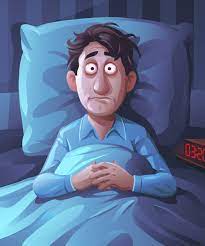More and more clients are visiting me suffering from insomnia or sleep related issues including anxiety, stress and the inability to relax. I’ve been there myself and know how debilitating it can be so I decided to investigate the processes of sleep, health implications and why it has now become the twenty first century quest to achieve the ‘Holy Grail’ of a perfect nights sleep. I’ve also done some personal training on Polysomnography (sleep study) and am now offering a Sleep Clinic in my hypnotherapy practice.
We all know that the process of sleep is fundamental to the health and well-being of all living things and, in reality, sleep generally accounts for 66% of our life span. It is a natural process necessary for health, recover and general regeneration (or physical repair) involving every tissue and system in the body. We need sleep to enable our cells to replenish at a faster rate than during our waking hours. Sleep allows toxins within the brain to be removed and chronic sleep deprivation contributes to our body’s malfunctioning. Current research suggests that common ailments e.g. hypertension, diabetes, cardiovascular disease and obesity, are as a direct result of not getting enough quality sleep. There is also evidence that being sleep deprived has a negative effect on our metal well-being and this deprivation can lead to us developing depression, psychosis and cognitive diminishment. I’m sure we’ve all experienced those ‘groggy’ days following a restless night – when we find the simplest of tasks difficult.
We do, of course, live in a time when life is basically 24/7…the constant possibility for ‘not switching off’ becoming more apparent as we can access ‘entertainment’ via our computers or smart televisions. That fast food can be delivered to our door or cooked within minutes in a microwave; that conversations across the planet can take place in an instance; that going home from work is not a modern concept as we continually access our emails. Our fear of missing out is preventing us from achieving the condition of sleep.

Lets remember that sleep consists of four different levels.
Initially, everyone enters the state of light sleep – a transition between being awake and sleeping very similar to those experienced during hypnosis. This accounts for 75% of our sleep period and this is when our body systems begin to slow down. Occasionally our electrical systems make us twitch but generally, our breathing becomes deeper and our brain reduces its activity. However, if you are finding it difficult to ‘drop off’ this stage can feel unachievable as we ‘replay’ our days, conversations or simply allow our worries to continue from day into night.
If we do achieve this first stage, then we continue our recharging journey by entering a deeper level of sleep. Overall muscles relax and our body temperature reduces. Our neural (or brain) activity slows further as we continue to enter into the sleep required to awake refreshed. At this point, we enter a state where our glands release hormones to help with our overall repair and regenerate process. This is also a time when we produce prolactin and cortisol – being deprived of these essential hormones is now linked to conditions of obesity. Simply put, it is impossible to achieve a healthy weight if you do not achieve this period of sleep.
So, how much sleep do we actually need?
Margaret Thatcher once stated that she only required four hours sleep per night (Trump went one better by claiming he only slept three hours) but they achieved the status of power nappers. I would argue that our sleep requirements are related to our age and circumstances and these will change over time.
Babies and young children require approximately 66% (or 16 hours per 24) sleep although I’m sure parents of a new baby may find this difficult to believe. Youngsters need their sleep to process the sensory information encountered during the day and achieve growth. And, only a child can achieve instant sleep – any where, any time.

As we age we require less sleep with an anomaly occurring during puberty – when teens encounter the ‘swing shift’ where natural sleep cycles are disrupted by the pressures of social media, education or the workplace combined with an increase of hormonal activity. To compensate for the reluctant risers (and parents this is a real phenomena), Universities are restructuring their days to include later lectures etc.
As adults however a healthy sleep is considered to be between six to ten hours per twenty four.
So what are the benefits of a healthy sleep pattern?
Prevention of weight gain. Sleep assists the production of cortisol. Plus if you are awake you use more energy therefore you will inadvertently over eat as your body requires more fuel.
Improved attention and concentration span. Sleep deprivation causes ‘brain fog’ making it difficult to focus on tasks and the incidence of accidents increases.
Learning and memory. Sleep allows us to process short-term memories into long term memories e.g. if sleep is deprived then the data of the day (short term) is lost because it hasn’t been put in the filing cabinet (long term memory).
Maintenance of healthy body systems. The chances of hypertension and cardiovascular disease decrease if you sleep well. Whilst awake the body maintains an increased blood pressure and physical stresses impact on the cardiovascular system.
Insulin levels are more regulated and diabetes can be reduced.
Immune systems are improved. We repair during sleep. Proteins and cells, within the immune system, are more likely to detect and destroy germs and viruses when sleep has been achieved. Great news in the middle of a pandemic!
Emotional wellbeing and mental health is improved. Stress hormones are reduced during the relaxation period.
Greater creativity and problem solving abilities as the brain has had time to process information.
So what can you do to help you achieve healthy sleep and ultimately a healthier lifestyle?

- Set yourself a reasonable time to sleep. If you currently go to bed at 11.30 pm, change it to 10.30 pm and see how that feels. Once you have established this (and it could take a few attempts) you can adjust your times to aim for about eight hours per night but keep it regular.
- Create a ‘sleep worthy’ environment. Ideally, remove electronic devices (think TV, tablets, phones, etc) from your sleeping area. This reduces blue light, which tells our brain it is daytime, and alters our perception of night.
Maintain a reasonable temperature (neither too hot or too cold), wear something comfortable, if necessary adjust the weight of your duvet.
Make going to bed a pleasurable, comforting experience.
- Stop watching TV etc., at least thirty minutes before bedtime. Over stimulation (if you watch Line of Duty) tells the brain it is needed and it will overthink.
- Avoid caffeine (that includes tea) and alcohol. These are stimulants not relaxants. I personally recommend not to drink coffee after 4pm.
- Exercise during the day but not just before bed. Exercise is great at tiring you out but that rush of hormones can create a restless night. Likewise, avoid a lack of activity and napping during the day.
- Bad day? Worrying? Write down how you are feeling. If the overthinking continues (recycling events, conversations and ‘what ifs’) try a little meditation. This can be as simple as focusing on your breath, listening to a meditation podcast or some slow, mindful music. Convince your brainwaves to slow down. Sleep will follow.
- A warm, but not hot, bath can often help. I find the use of lavender or chamomile in the water helps. Equally useful, using essential oils – once your brain associates the smell of an essential oil on your skin, it recognises it is time to sleep when used again.
- Allow your ‘prehistoric’ brain to recognise the pattern of sleeping. Close your curtains and turn off the light. Mimic night if necessary, the mind reacts to circadian rhythms of life. Wear an eye mask if you need to.
- Still not sleepy? Don’t worry. Lay quietly, set your mind a task like counting backwards from one thousand in threes, saying (in your mind) a multiplication table or the alphabet backwards. This focuses your attention on something other than your daytime problems and allows the brain to alter its brain patterns.
And finally…
- Consult with me (07775429575)…attend my sleep clinic, join one of my relaxation workshops or have a hypnotherapy session. Don’t worry alone, let me help you learn how to sleep like a baby and awake ready for a new day.
Sweet dreams!




